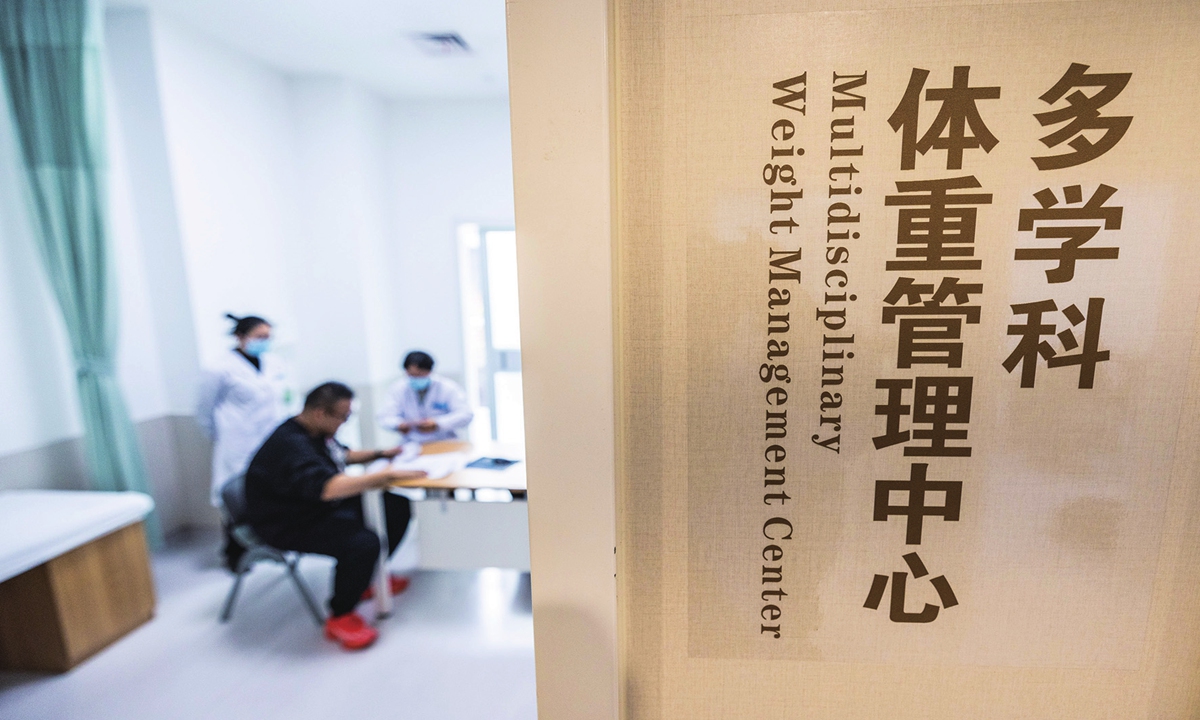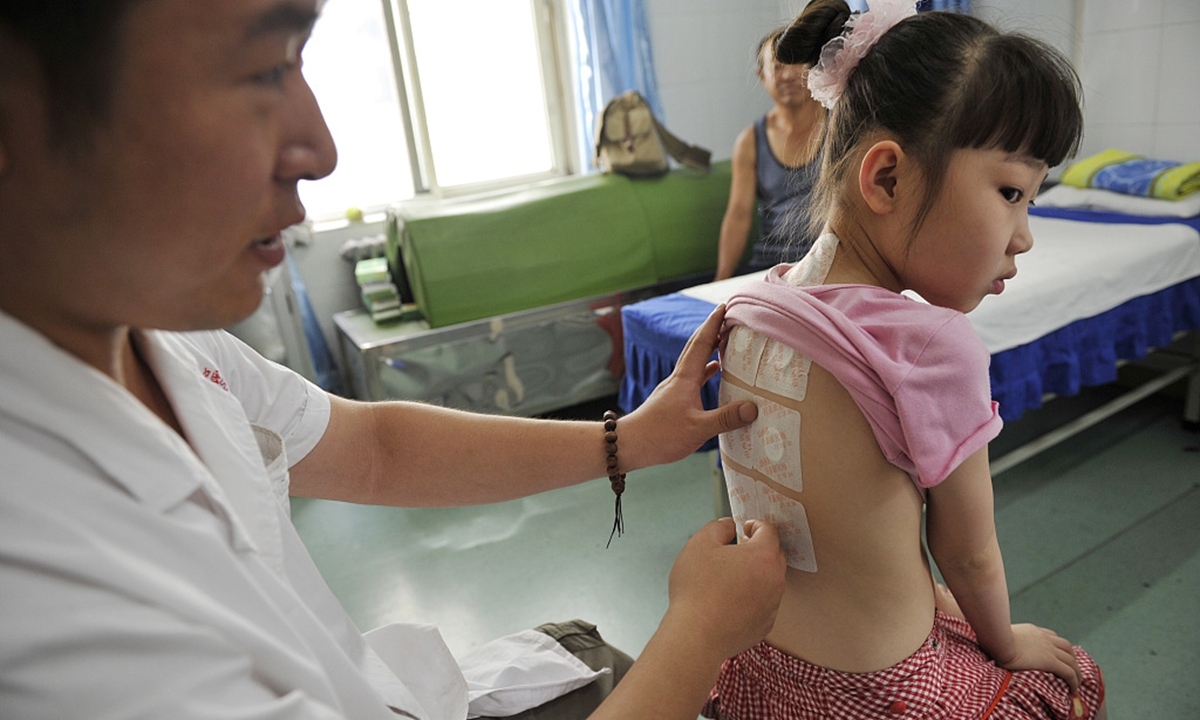LIFE / TRENDS
From hospitals to campuses: China’s nationwide push for healthier living
Weight Management

The Multidisciplinary Weight Management Center at the Huzhou Central Hospital in East China's Zhejiang Province Photo: VCG
"Trade your weight for a ticket! I pay, you lose weight!" Recently, the Wunü Mountain Scenic Area in Benxi, Northeast China's Liaoning Province, set up a BMI (Body Mass Index) measuring device at its entrance: Visitors with a BMI between 24 and 27.9 get half-price tickets. And visitors with a BMI over 28 get in for free.
BMI is calculated from a person's height and weight. It's an internationally used standard for estimating whether a person has a healthy body weight based on their height. Usually, a BMI over 25 is identified as unhealthy for Asian people. The regular entrance fee to Wunü Mountain is 70 yuan ($9.61) per person. The BMI-based ticket discount is open to visitors nationwide and the discount run from April 7 to April 27.
From April 7 to 15, the scenic area welcomed 3,480 visitors, with 1,320 benefiting from the promotion. More men than women took advantage of the discount, reported People's Daily Online.
China is intensifying efforts to tackle rising obesity rates by adding a nationwide weight management campaign to its Healthy China initiative, a comprehensive public health strategy launched in 2019 to improve national health outcomes. In early April, China's National Health Commission (NHC) announced a new nationwide weight management campaign that sets goals through 2030, aiming to create supportive environments, boost public awareness and skills, promote healthy lifestyles, and slow the country's rising obesity rates.
The scenic spot's unique discount policy made it onto the trending chart on China's X-like social media platform Sina Weibo. Some netizens praise such a novel idea, and many have been calling for local destinations to follow Wunü Mountain's example.
Following the wide spread of the news, doctors are advising people with a high body weight to be cautious about climbing mountains or hiking for weight loss, noting that hiking increases strain on the knees and the cardiovascular system, raising the risk of falls or injuries. Instead, they recommend low-impact activities like swimming or walking on flat surfaces, as they minimize joint pressure.
For those who are determined to lose weight but are not sure whether they have chosen the method that best suits them, multidisciplinary weight management clinics in hospitals nationwide could provide a solution.
Professional support
NHC Director Lei Haichao announced at a press conference on people's livelihood for the third session of the 14th National People's Congress in March that they will step up efforts to guide healthcare institutions nationwide to establish more weight management clinics. These clinics will offer professional support for residents to manage their weight and improve overall health.
Global Times reporter went to the Beijing Shijitan Hospital to visit the local weight management clinic. After registering online, patients can select an AI pre-diagnosis. By answering questions like "Do you have trouble sleeping or have you lost your appetite lately?" Prospective patients can help doctors efficiently gain a preliminary understanding of the patient's condition.
Later, the test results obtained from a body-composition scan and body fat-analyzer scale show data about fat mass, muscle mass, and body fat percentage, providing a more accurate picture than BMI.
Associate chief physician Wang Dezhong, from the Obesity and Metabolic Disease Center at the hospital, told the Global Times that the hospital has launched a multidisciplinary weight management clinic since April 16. By integrating five key departments including bariatric and metabolic surgery, nutrition, and Traditional Chinese Medicine (including acupuncture), the clinic focuses on tackling the complex causes behind obesity, such as metabolic imbalances and hormonal disorders.
The hospital uses medical knowledge, structured management, and smart tools to help patients overcome challenges and avoid complications from weight loss. Clinical monitoring can detect issues like nutrient deficiencies, anemia, or unhealthy muscle loss instead of fat loss, the expert explained.
Peng Lu, attending physician at the Clinical Nutrition Department of the hospital, told the Global Times that the Center also regularly sends medical staff to community service stations to provide outreach services, including health education lectures and free consultations. It also collaborates with weight-loss camps to offer scientific guidance.
Healthy campuses
Aside from health institutions, college campuses have been ramping up efforts in helping students with weight management too. Dalian University of Technology for instance, launched a special "Weight Management" training program specifically designed for students with a BMI of 30 or higher. The program features a combined plan of physical exercise, healthy eating, and psychological counseling, aiming to raise awareness about weight management and to encourage a healthy lifestyle.
Under the guidance of professional instructors, students will participate in 21 consecutive days of structured boot camp. The university also works with a team of nutrition experts to develop meal plans that balance taste, nutritional value, and calorie control.
Such meals aren't only welcomed by students concerned about weight management - they're also affordable and balanced. A junior student of the university told the Global Times that a typical meal of a corn pancake, grilled chicken breast, and a bowl of seaweed and egg soup costs just 6.5 yuan. ($0.89)
Several universities have also introduced healthy meal options in their cafeterias to support students' weight management following the meal plan.



